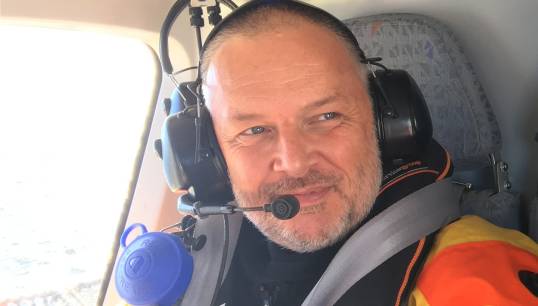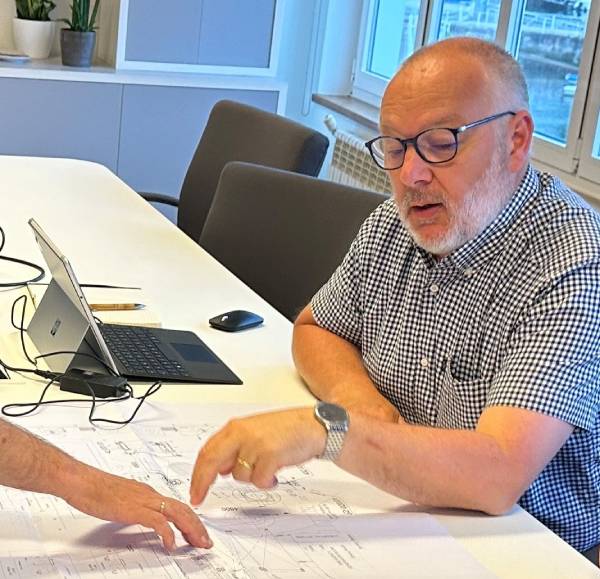
Merchant Navy Medal winner, former master and Nautilus member Phil Day reflects on a maritime career shaped by war zones, woodsmoke, navigational safety, volunteering and a schoolboy’s love of poetry. Now director of operations for the Northern Lighthouse Board (NLB), in 2025 he received a UK Merchant Navy Medal for services to safety and welfare. Here, he reflects on a maritime career which led to receiving an annual UK State Award for seafarers. Interview by Deborah McPherson
What is your rank in your sector?
I am currently director of operations at the Northern Lighthouse Board, and a former captain
What originally attracted you to a career in maritime?
Believe it or not a romantic ideal based on a poem, Cargoes by John Masefield, which I had learnt at school - the third stanza ('Dirty British coaster with a salt-caked smoke stack' was the clincher at the age of 10!) - and I suppose old films.
The desire to go to sea remained with me from a young age and when the time came, I went off to the careers teacher. In rural North Yorkshire this was an unusual career path and consequently I was pointed to a few books and left to my own devices. In 1984 with the global changes in shipping I got more rejections than anything but ultimately started a cadetship with the RFA in 1986 at the age of 18.
Do you have any personal or family connections to maritime careers?
In the broadest sense yes, my grandfather was a stevedore ( as was his father) in the London docks and my father in the early part of his career worked in the city as a clerk for a commodity importer/exporter. I married into a seafaring family with my wife a former second officer, and my son who was initially at sea and now a naval architect.
Tell us some of your career highlights so far
Setting aside the award of the Merchant Navy Medal which is a great honour and privilege to be nominated for let alone receive.
My time [at sea] in the Royal Fleet Auxiliary (RFA) was a fantastic training ground where I benefitted from generous and supportive colleagues. There, the most striking memories are of being involved in the first Gulf war in 1990/91. I was on a ship that supported the RN mine hunters post-war in Kuwait. Seeing the almost deserted and looted Kuwait city, the detritus and mess of war as well as the burning oil fields will stick with me. Moving to the commercial tanker sector was a massive learning curve, I became a mate pretty quickly onboard a VLCC. Those dirty ballast and free flow vessels were a massive challenge to operate but actually I got great satisfaction from it. The nights at sea in tropical waters, with the smell of wood smoke from Indonesia remain in my mind. This provided a springboard to the North Sea and DP shuttle tankers where I remained for quite a few years on the same vessel MV Aberdeen eventually making command. I worked with a fantastic group of mariners for seven years. We loaded from FPSO offshore and took crude oil all over Northern Europe. I came ashore in 2004 initially to Hound Point Marine on the Firth of Forth as loading master and then team leader. I learnt a lot about Health Safety and the Environment (HSE) management and asset management which ultimately held me in good stead for joining NLB at the end of 2007.
But I see the NLB director of operations role as the career pinnacle to date. Not only ensuring Scotland's marine aids to navigation are kept in good condition – running two vessels and managing another group of fantastic people – but also helping shape international policy and standards for aids to navigation through my work at the International Organisation for Marine Aids to Navigation (IALA). This IALA work has also meant learning how international cooperation and rule-making works in maritime, and working closely with colleagues across the UK Maritime and Coastguard Agency, the Department for Transport, and the Scottish Government and with other NLB colleagues, in delivering mariners safe navigation now and for the future.
What have been some of your biggest career challenges?
It's not all been plain sailing and whilst 99.99% of people have been wonderful, there has from time to time, been the difficult character – especially in my junior officer days. I remember well a master that took great delight in the needle game (bullying really) trying to wind up his newby second officer.

The biggest career challenge, however, was coming ashore. Financially moving from a tax free income was a real challenge. It probably took me some two years to be used to the life, whereas my wife says it took the family 10 years to get use to me not going away! There is a substantial cultural shift from being on a ship with a routine and hierarchy to shore-based working. Two years of shift work helped the transition; as did learning how to lead differently, as well as all the management processes, where it helped initially that I worked for a large company which provided training and coaching.
Do you think maritime is gearing up well for the transition to new fuels and future technology?
I think shipowners and operators are moving relatively quickly to adopt various solutions. Whilst battery technology is ready for short sea electric, often the grid ashore is lagging; and the vessels that need longer endurance and therefore a fuel have more of a problem. There is no one fuel solution and certainly in the UK domestic fleet we are struggling with fuel supply. Which fuels are going to be available, when and where is the big question. It's a real gamble which one to pick especially – if you are not bunkering at the same port each time.
What is your favourite place you have visited during your career, and why?
Well most oil terminals look the same; it's just they are either warmer or colder. But inevitably those places that have evocative memories that I remember are: runs ashore in Dubai( before it was developed) for a haircut and curry; night clubs across the world from Dunfermline to Singapore; but I have to say the Inner and outer Hebrides in May or June, which I have come to know and love, is my favourite of all. The wildflowers in bloom, and the bird song and stillness bring a sense of peace I have not found so completely anywhere else.
Who has helped you the most in your career?
This is going to sound corny: my wife. If your partner is not supportive of your seafaring career its impossible to carry on. To be at home half the year without you, put up with the vagaries of joining and relieving dates, to put up with you rejoining a ship early with a new-born in the house, or to sit and help with study prior to exams have been the biggest help in my career by far.
How long have you been a member of Nautilus?
A member for nearly 40 years since 1986, I joined as in those days the RFA sent the union application with your joining pack. I have stayed a member ever since largely for the legal protection and when I have worked in companies that recognise Nautilus, the ability to engage in pay discussions.
Do you recommend Union membership?
Yes absolutely. You never know when the legal support and assistance available will be useful. It might not be your fault, and your employer might be great, but one day you may just be involved in an event where you need to be able to contact someone for help. These days I am on the other side of the pay discussions, but Nautilus and other unions have an important part to play – you have no voice in the discussions/negotiations otherwise.
What one change do you think would make the biggest positive difference to jobs for maritime professionals?
I am not sure there is one change in maritime that would make such a striking difference. The industry is just so broad. I do think more could be made of training to prepare seafarers for working ashore. Such a large proportion do come ashore at some stage ( and always have) and making the transition is not always easy.
Are you involved with any maritime charities or volunteer organisations?
I am a trustee of the Scottish Nautical Welfare Society – a small organisation that provides regular grants to former seafarers and their dependants in need. We employ a small team of case workers who visit our recipients regularly ensuring they are getting help and assistance as needed. They also double up as hosts and cooks for our monthly luncheon club which operates in Whiteinch Glasgow which provides a subsidised meal as well as magnificent Christmas parties and trips out. It wouldn’t work without the commitment of the team and we are eternally grateful for the effort and care they put into their work. If readers know of anyone who may benefit from the services of the society, please do get in touch.
What do you like doing in your free time?
I am a gardener and DIYer in the main, but between major projects at the moment. I love reading when time allows and getting a good walk in whether in town or the country is a real treat, a distraction from work and a great stress reliever.
Is there anything else you'd like to talk about?
Only to say thank you to all those along the way that have helped make my career to date such an enjoyable and fulfilling journey.
Tags
More articles
Latest Off Course podcast features Captain Phil Day on alternative fuels training
The latest Off Course podcast features Captain Phil Day, Northern Lighthouse Board director of operations, discussing the urgent challenges facing seafarers as the industry transitions to alternative fuels.
